This morning, via a Facebook Live video, Metro kicked off its first electric bus in regular customer service. One electric bus is now in service on the Metro G Line (former Orange Line) Bus Rapid Transit, located in the San Fernando Valley.
In 2017, full electrification of the G Line was anticipated to be completed by June 30, 2020. Metro's schedule slipped six months, so the BRT line is now expected to be fully electric by the end of December 2020. The delay does not bode well for electrification of the full Metro bus fleet - scheduled for 2030 - with some key 2020 electric bus procurement decisions also delayed.
Tune in live at 10:30 a.m. with @MayorOfLA as we deploy our first electric bus on the G Line (Orange)! Watch here: https://t.co/tZBEeXzbKX pic.twitter.com/6r6tKXO2E7
— Metro Los Angeles (@metrolosangeles) July 27, 2020
This morning, Los Angeles Mayor Eric Garcetti highlighted G Line electrification benefits including zero carbon climate-friendly transportation, cleaner air, smoother ride, and less noise pollution. City Councilmember Paul Krekorian praised electric buses as "essentially silent," better for operators, and a return to the power source behind the historic Pacific Electric Railway that used to operate along what is now the G Line busway.
Metro CEO Phil Washington stressed that Metro is "totally committed to electrifying these bus lines... [with] total electrification by 2030." Washington also touted other upcoming upgrades to the G Line - grade separations and railroad-type gates - which are expected to improve bus speeds with a "20 percent decrease in run-time." That project is currently expected to begin construction in 2021 and to open in 2024.
The G Line BRT operates with a fleet of forty 60-foot articulated buses, currently nearly all running on Compressed Natural Gas. The battery electric buses now making their way into service are manufactured by New Flyer.
Metro’s second fully-electric bus pilot on the J Line (former Silver Line) is scheduled for next summer. The 40-foot electric buses for that line are being manufactured by the problem-plagued BYD.






